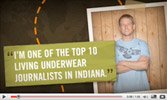Reshoring the outdoor apparel industry: An interview with J. Brandon of Ascent Douglas
This interview is part of my Glocal Interview series.
President Obama, with his American Job Act, isn’t the only one focusing on job creation. Below J. Brandon of Ascent Douglas - a movement to bring outdoor apparel manufacturing into Douglas County Nevada - offers some interesting insights into how one community is trying to create jobs.
What’s in a job? For every $1 of sales related to manufacturing, there is a $1.40 return throughout the U.S. economy. This is opposed to overseas manufacturing in which for every $1 of sales there is a 58-cent output.
###
Where are you a local?
I live in Gardnerville, in Douglas County, Nevada. I’ve also lived in Silicon Valley, the Pacific Northwest, Las Vegas, and as a child, very briefly in Southern California. I was born in the UK.
What is the economic situation currently in Douglas county?
Nevada’s economy suffered more than the rest of the country in the past few years. Prior to that, we were the fastest growing state. Houses were popping up by the tens of thousands in Las Vegas, the construction industry was raging, and people were moving here from all over. Although Douglas county is very rural and more than 400 miles from Las Vegas, we saw a lot of that here as well. Housing construction fueled the economy. It disappeared almost overnight and suddenly a lot of people were out of work.
In November 2007, the unemployment rate in the US, in Nevada, and in Douglas County was 4.4 to 4.6 percent. By June 2008 it was 5.7 percent in the US, 6.3 percent in Nevada, and 6.8 percent in Douglas County. Unemployment in the US peaked in January 2010 at 10.6 percent. In Nevada it was 15.3 percent. In Douglas County it was 16.7. Since April 2010 the rate has been under 10 percent in the rest of the country. It’s still above 13 percent in Nevada and 14 percent in Douglas County.
One of my neighbors has lived in his house for more than 20 years. He used to run a small excavating company. He could pick and choose what jobs to take and was winding down toward retirement. Now, he has sold his equipment and drives an 18-wheeler between Reno and Sacramento five nights a week.
But we are optimistic. We get to live in a beautiful place with a portion of Lake Tahoe in our county. Our mountains reach up to more than 10,000 feet above sea level. We can snowboard at a world-class resort and go for a mountain bike ride in the high desert on the same day. We have four distinct seasons, 300 days of sunshine a year, and tremendous amounts of accessible public land. At night we can step out into our back yards and see the Milky Way, watch for shooting stars, and listen to coyotes.
What is Ascent Douglas doing and how does the outdoor apparel industry factors into that?
That scenery and that big outdoor lifestyle are some of our strongest assets. For many of us, it is why we moved here. That’s true for me. I left Silicon Valley and came here to work as a backcountry guide.
So Ascent Douglas is an effort to share what we love with other folks. Many, if not most, outdoor equipment companies are started by people who are very passionate about the outdoors. You’ll often find these companies located in small towns with big outdoor lifestyles right out the back door. Yvon Chouinard, the founder of Patagonia, Inc. expressed that in the title of his book, “Let My People Go Surfing.” Patagonia makes outdoor clothing and gear and is headquartered in Ventura, California with great surfing right nearby. Its service and distribution center is here in Northern Nevada.
The subtitle of Mr. Chouinard’s book is “The Education of a Reluctant Businessman.” Ascent Douglas aims to educate people in the outdoor equipment industry about the opportunities in our community. We’ve got a ready workforce, affordable housing, low costs of doing business, and you might even be able to see a bald eagle fly right by your office window.
That appreciation for the outdoors often shows up in the values and ethics of these companies. They tend to work hard to minimize waste and are generally fairly clean industries. Their customers tend to be well-informed and concerned about how their buying decisions affect the world they live in. Companies that foster that sense of connectedness tend to be pretty good corporate citizens. These are the kinds of businesses we would like to see in our community.
Outdoor apparel is more technical than simple tee-shirts and jeans. It’s also sold in smaller volumes and the companies that make it are often much smaller than other clothing companies. So the market is more volatile, the risks are higher, and the decision makers are much closer to the end user and easier to talk with. All of these factors help make outdoor clothing and gear an attractive market for our efforts.
With wages in some countries being less than a dime an hour, how is “Made in America” even possible?
American companies have spent the past few decades moving manufacturing offshore. Most of them made that decision because of cheaper labor. Many are discovering that cheap labor can be very expensive.
Harry Moser retired as the president of a company that makes machine tools for industry. He lives near Chicago. His father and grandfather spent their entire careers in the Singer Sewing Machine factory in New Jersey. Mr. Moser founded a non-profit called the Reshoring Initiative . He travels the country talking about why reshoring is good for America. More importantly, he talks with individual companies about why it might make sense for them.
The Reshoring Initiative offers a free tool called the “Total Cost of Ownership” model. It compares the costs of manufacturing in 17 countries based on 29 factors and can predict costs five years into the future. Labor costs are just one data point. Total costs account for things like travel time to manage offshore suppliers, inventory expenses while product is in a container crossing the ocean instead of in your warehouse ready to be sold, increased costs for quality assurance, the risks of intellectual property theft, and more. For many companies and many products, offshore manufacturing turns out to be very expensive.
At the Outdoor Retailer tradeshow in Salt Lake City recently we sponsored a panel discussion called “Made in America: The New Push to Reshore Production.” One of our panelists was Kaushal Chokshi, the founder and chairman of Quickstart Global. Mr. Chokshi has been managing international businesses for more than 25 years. He mentioned that when he travels to Mumbai, India his hotel room costs several times more than a hotel room in San Francisco. He wrote recently that property in Shenshen, China costs three times as much as property in Austin, Texas. He also predicts that advances in manufacturing technology will make it even more expensive to have huge inventories traveling by container ship to get to the end user. His forecasts show that customer demands and easy mass customization will bring at least final assembly much closer to the final purchaser. This would happen even if the cost of manufacturing offshore did not increase. And it is going up.
###
I have no idea if the apparel industry wants to move to Douglas county, but, after reading J. Brandon’s description, I want to!

















 Digg
Digg Facebook
Facebook Flickr
Flickr LinkedIn
LinkedIn StumbleUpon
StumbleUpon Twitter
Twitter











